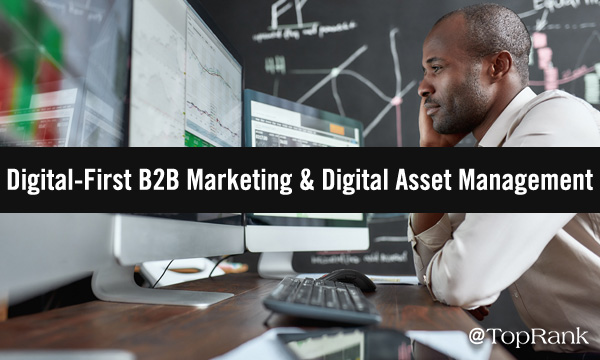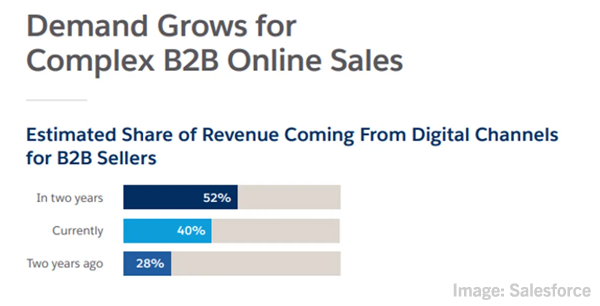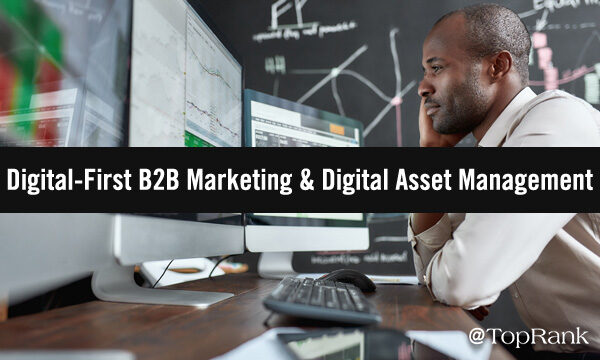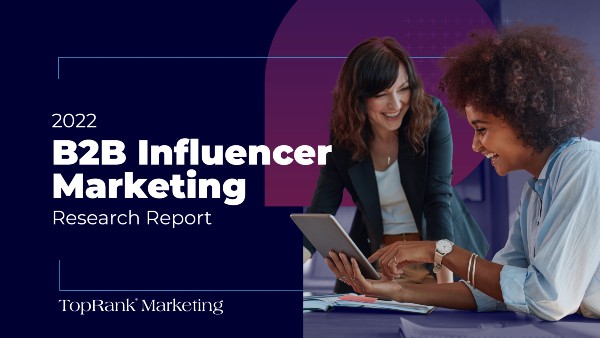
The pandemic has ushered in a new digital-first era for B2B brands, complete with an ever-deeper and more complex ocean of digital assets — but how can today’s organizations and marketing teams keep track of this influx of online content?
Before the pandemic, digital asset management systems — DAM for short — were mostly seen as either a luxury that could be afforded only by large global corporations or as an über-nerdy technology used by musty librarians or professional photographers and videographers.
Earlier this year however, Adobe’s Digital Trends Report revealed that nine out of ten business leaders said customers are now digital first, with 54 percent planning to spend more on customer data technology and 52 percent expecting to increase spending on customer experience management systems.
B2B buyers have increasingly brought online whatever offline processes they still had in place, and research data from Salesforce has shown that 52 percent of B2B sellers expect more than half of their revenue to come from digital channels in the next two years.

As most of the B2B ecosystem has shifted to digital-first operations, marketers can now see more benefits than ever from using a DAM system, from the speed and agility of digital asset delivery to optimized online content management and more.
It comes as no surprise that the market for DAM solutions has rapidly grown, with the global DAM market valued at $4.7 billion in 2021, and expected to reach $13.4 billion by 2027, according to data from IMARC.
Let’s take a look at some of the leading reasons why B2B marketers need digital asset management more than ever in a digital-first playing field.
“As most of the B2B ecosystem has shifted to digital-first operations, marketers can now see more benefits than ever from using a digital asset management (DAM) system.” — Lane R. Ellis @lanerellis Share on X1 — Digital-First Produces Mountains of Online Content
Digital assets are comprised of any computer files, stored anywhere — whether on your phone, tablet, desktop, network, or in the cloud.
DAM software runs either on a local computer network or in the cloud, and has been built to pull in and make it easy to organize an unlimited number of files — all the digital assets that organizations are creating and using daily in our digital-first environment.
The more complex your marketing strategies and the structure of your organization are, the bigger the benefits of using DAM software can be, especially over time, as the advantages of having conveniently managed digital assets pile up.
In today’s digital-first marketing world, some of the greatest gains can come from increased workflow efficiency, and this is where DAM systems generally shine.
B2B firms that use a modern DAM system have immediate access to all their digital assets, with nothing getting lost in un-indexed folders or in data that is stranded on individual laptops — all helping to save untold amounts of time compared to firms that don’t use DAM software.
A proper DAM tool also helps B2B firms when it comes time to conduct an asset inventory, either for data analysis, capital investment tracking, or other purposes — an example of how organizations can find benefits from a DAM system that go far beyond public-facing marketing efforts.
2 — Digital-First Requires Faster Delivery & Response
Marketing campaigns, especially in the B2B realm, often involve many people and multiple teams, consisting of a complex variety of images, document files, videos, and other digital assets.
Additionally, tracking multiple versions of files — with varieties specifically created for each social media platform involved in a campaign — can quickly get complicated, and many firms either use a cobbled together approach that may be known only to a few people in the organization, or end up bouncing around from one software solution to another.
At the same time, B2B customers now want the information they need as quickly as possible, which means that organizations that have a smoothly-running DAM in place are generally better equipped to get best-answer content published online faster than those that don’t.
Some of the top DAM solutions also offer transparent and robust import and export routines, so that organizations aren’t locked-in to one DAM environment with their digital assets held hostage, unable to easily migrate to other solutions if needed.
Digital-first marketing benefits from using DAM through increased efficiency and time savings, which result in quicker content publishing times and ultimately more satisfied audiences.
The type of savvy content management offered by DAM systems can save marketing teams 13 days annually per staff member, according to report data from Canto.
The same research found that 41 percent of marketers said that digital filing inefficiencies had caused delayed project releases, and 54 percent revealed that they experienced frustration with inefficient filing systems — each an example of why more B2B firms are implementing DAM solutions in their digital-first content creation and publishing workflows.
“Digital-first marketing benefits from using DAM through increased efficiency and time savings, which result in quicker content publishing times and ultimately more satisfied audiences.” — Lane R. Ellis @lanerellis Share on X3 — All Digital-First Content Formats Get a Boost with DAM
Whether you’re dealing with content destined for traditional video or still imagery, or material meant for emerging social media platforms such as the metaverse and BeReal, a DAM system is more than up to the task of organizing all your organization’s digital assets.
As with static digital assets, a powerful DAM system easily ingests and organizes video content, augmented or virtual reality files, and more — putting it all at the fingertips of each person in an organization who needs it, from video editor to social media manager to corporate executives.
An additional benefit of a top-notch DAM solution is the ability to surface hidden, overlooked, or forgotten content in an organization’s archives, which can then be put to use where appropriate, oftentimes avoiding time-consuming efforts to re-do work that has already been completed but can’t easily be found.
Re-purposing content on social platforms in digital-first initiatives can have a new lease on life when every digital asset can easily come into play and be creatively combined in new ways, thanks to the indexing and searching features of a powerful DAM system.
For B2B marketers, the shift to always-on marketing is a perfect match to meeting the demands of digital-first customers, and here the advantages of a DAM solution shine brightly, removing many of the bottlenecks slowing down traditional marketing, by offering easy and swift access to a firm’s entire digital asset archive.
Boost Your Digital-First Muscles with DAM
In the new digital-first B2B marketing era, having the organizational muscle of a digital asset management system is more important than ever, and we hope that this brief look at some of the reasons why has been helpful. To learn more about DAM systems for B2B marketers, be sure to also check out our “Why B2B Marketers Should Give a DAM: Top Tips on Digital Asset Management,” and “Why Digital Asset Management Matters in B2B Marketing.”
A DAM system is just one tool in the B2B marketer’s digital tool-bag, yet one that successful organizations will increasingly omit at their peril as we head towards 2023.
More than ever before, creating award-winning B2B marketing that elevates, gives voice to talent, and humanizes with authenticity takes considerable time and effort, which is why more brands are choosing to work with a top digital marketing agency such as TopRank Marketing. Reach out to learn how we can help, as we’ve done for over 20 years for businesses ranging from LinkedIn, Dell and 3M to Adobe, Oracle, monday.com and many others.




